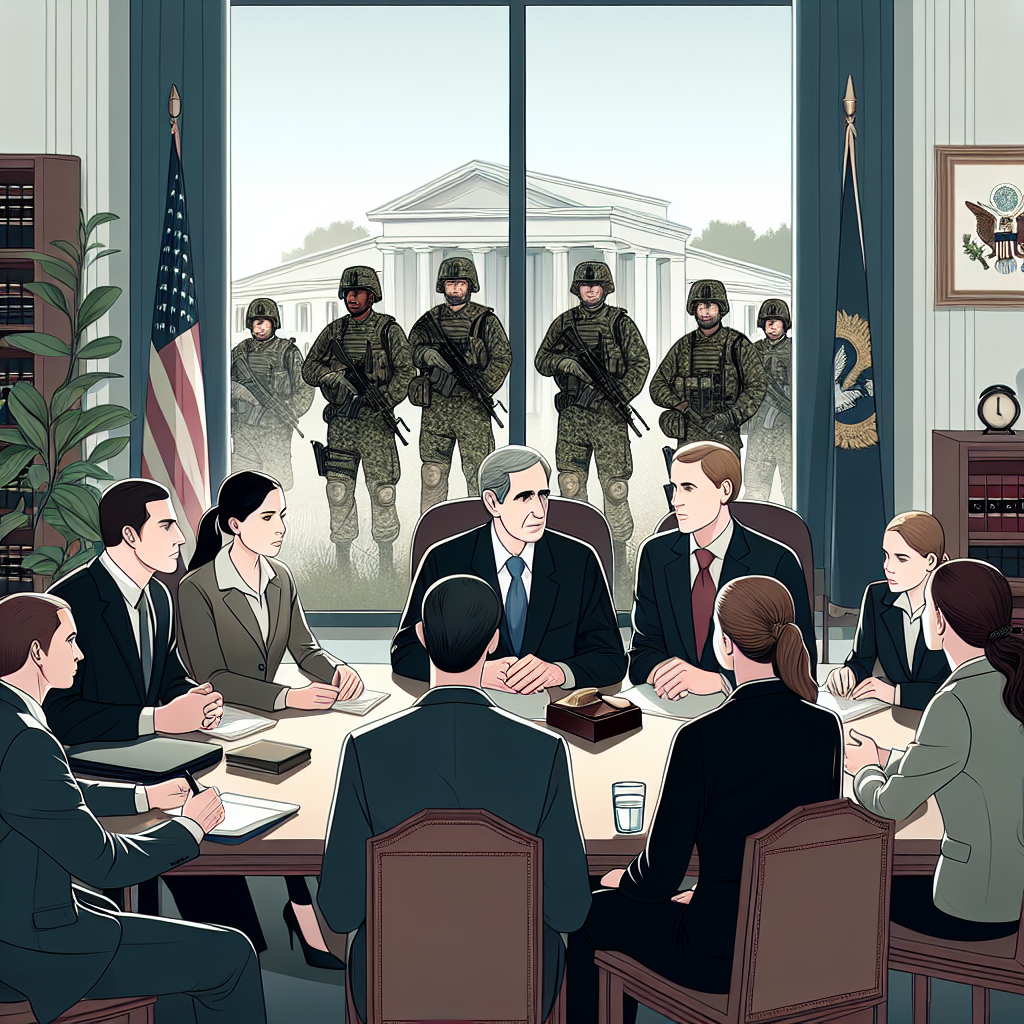The deployment of the National Guard by the Trump administration has sparked a significant legal confrontation with state officials in Illinois and the city of Chicago. This conflict centers around the interpretation of federal law regarding the president’s authority to call upon the National Guard, particularly in situations where he believes he cannot rely on regular military forces to enforce federal laws. As the situation unfolds, both sides have presented their arguments to the Supreme Court, raising critical questions about the limits of executive power and the role of state authority in federal matters.
Context of the Legal Dispute
On a recent Monday afternoon, the Trump administration and legal representatives for Illinois and Chicago filed additional briefs in response to a Supreme Court order. This order necessitated a discussion on whether the term “regular forces” in the federal law invoked by President Trump refers specifically to the U.S. military. The administration contended that this term encompasses civilian law enforcement rather than military personnel, thereby justifying the deployment of the National Guard to address issues in Chicago.
U.S. Solicitor General D. John Sauer emphasized that while the standing military could have been used to address violent resistance to federal immigration enforcement, it is crucial for courts to grant “extraordinary deference” to the president’s decisions regarding the National Guard’s deployment. This argument underscores the administration’s perspective that the National Guard is a legitimate and necessary resource in managing civil unrest.
Arguments from the State of Illinois and Chicago
In response, attorneys for Illinois and Chicago argued that the phrase “regular forces” should be interpreted as referring to the full-time, professional military. They challenged the Trump administration’s assertion, urging the Supreme Court to uphold a federal judge’s order that prevents the president from deploying the National Guard in Chicago. Their position hinges on the claim that the administration has not demonstrated an inability to execute federal law in the city using the U.S. military, which is a prerequisite for calling upon the National Guard.
This legal battle has evolved into a notable chapter in the ongoing discussions regarding the deployment of the National Guard in Illinois. Following Trump’s authorization of 300 National Guard members to be sent to Chicago in October, the state and city quickly mounted a legal challenge, emphasizing the potential implications for executive power and state sovereignty in federal matters.
Implications of the Court’s Decision
The outcome of this case may set a significant precedent regarding the limits of presidential authority in deploying the National Guard. A ruling in favor of the Trump administration could enhance the executive branch’s power, allowing for greater flexibility in responding to civil unrest and other emergencies. Conversely, a decision favoring Illinois and Chicago could reaffirm the necessity of state control over law enforcement matters and limit the circumstances under which the National Guard can be deployed.
As the Supreme Court deliberates, the legal arguments put forth by both sides will play a critical role in shaping the future of National Guard deployments across the nation. The balance between federal authority and state rights is at the heart of this legal dispute, and the implications extend beyond the immediate situation in Chicago.

Key Considerations for Future Deployments
- The definition and scope of “regular forces” in federal law.
- The balance of power between state and federal authorities.
- The historical context of National Guard deployments in civil unrest situations.
- The potential for future conflicts over executive power in similar scenarios.
As this case progresses, it will be essential to monitor the legal arguments and the eventual ruling from the Supreme Court. The implications of these decisions will resonate across various domains of governance and law enforcement. For further reading on the implications of the Trump administration’s actions, consider exploring the trump administration corruption and its impact on legal frameworks. Additionally, the discussions surrounding trump legal disqualification provide further context to the ongoing legal battles involving the former president.
The ongoing legal battle between the Trump administration and the state of Illinois, along with the city of Chicago, has raised significant questions regarding the deployment of the National Guard. Central to this dispute is the interpretation of federal law that governs the president’s authority to mobilize military forces for domestic issues, especially in circumstances where federal law enforcement may be insufficient. This conflict is emblematic of the broader tensions that arose during the Trump presidency, particularly concerning the balance of power between federal and state authorities.
Legal Framework and Arguments
At the heart of the matter is a federal law that allows the president to deploy the National Guard when he is unable to execute the laws of the United States with regular forces. The Trump administration has argued that the term “regular forces” should not exclusively refer to the U.S. military but can include civilian law enforcement. This interpretation aims to grant the president broader discretion in addressing what he perceives as threats to public order, particularly in urban areas like Chicago. Supporters of this view, including U.S. Solicitor General D. John Sauer, contend that historical precedents warrant a flexible understanding of this terminology, suggesting that extraordinary deference should be given to the president’s decisions regarding national security.
Conversely, lawyers representing the state of Illinois and the city of Chicago maintain that “regular forces” explicitly refers to the professional military, arguing that the administration has not sufficiently demonstrated its inability to execute federal law using existing military resources. They assert that the deployment of the National Guard should be viewed as a last resort, not a primary option. This legal contention reflects a broader concern about the militarization of domestic law enforcement and the potential implications for civil liberties. Their position is bolstered by a federal judge’s ruling that temporarily barred the president from deploying the National Guard to Chicago, a decision they urge the Supreme Court to uphold.
Implications of the Supreme Court’s Decision
The Supreme Court’s involvement in this case marks a critical juncture in the ongoing debate over executive power and state rights. The outcome will not only affect the immediate situation regarding the National Guard’s deployment but could also set significant precedents for future interactions between state and federal governments. Should the Court side with the Trump administration, it may embolden future presidents to act unilaterally in similar situations, potentially leading to increased federal intervention in state affairs.
On the other hand, a ruling in favor of Illinois and Chicago could reinforce the principle of state sovereignty, emphasizing the importance of checks and balances in the federal system. This situation is reminiscent of other contentious legal battles during the Trump administration, such as the trump administration SNAP issue, where state and federal interests clashed over policy implementation. The implications of this case could resonate far beyond Chicago, influencing how similar disputes are handled across the nation.
Political Context and Reactions
The political climate surrounding this case is charged, as it reflects broader societal divisions regarding law enforcement and the role of the military in domestic issues. Critics of the Trump administration’s approach argue that deploying the National Guard to cities like Chicago exacerbates tensions between communities and law enforcement, particularly in areas already grappling with issues of police violence and systemic racism. They argue that a reliance on military solutions undermines efforts to reform law enforcement practices and address the root causes of unrest.

Supporters, however, contend that the deployment of the National Guard is necessary to maintain order in the face of violence and unrest. They assert that the administration’s actions are justified under the premise of protecting citizens and ensuring public safety. This dichotomy reflects a larger national conversation about the appropriate use of military resources in domestic law enforcement, a topic that has gained prominence in recent years.
As the legal proceedings continue, the situation remains fluid, with potential ramifications for future administrations. The outcome could either reaffirm or challenge the executive branch’s authority in domestic matters, influencing how future presidents approach similar situations. The ongoing discussions surrounding this case will likely shape the legal landscape regarding federal intervention in state affairs for years to come, much like the trump tariffs court case, which examined the limits of executive power in economic matters.
In conclusion, the legal battle over the National Guard’s deployment in Chicago serves as a critical examination of the balance of power in the United States. As the Supreme Court deliberates, the nation watches closely, aware that the implications of this case extend far beyond the immediate context of law enforcement and public safety.
The ongoing legal battle between the Trump administration and the state of Illinois, particularly the city of Chicago, revolves around the deployment of the National Guard. This conflict has raised significant questions about the interpretation of federal law regarding the president’s authority to call up the National Guard, especially in situations where federal law enforcement is deemed necessary. The implications of this case extend beyond immediate legal concerns, touching on broader issues of federalism and executive power in the United States.
Legal Interpretations and Arguments
In the briefs submitted to the Supreme Court, the Trump administration contends that the term “regular forces” should be interpreted to include civilian law enforcement rather than solely the military. U.S. Solicitor General D. John Sauer emphasized that while military forces could address violent resistance, the president’s decision to deploy the National Guard should receive significant deference from the courts. This argument suggests a flexible interpretation of the law that allows for a broader understanding of the resources available to the president during a crisis.

Conversely, lawyers representing Illinois and Chicago argue that the phrase “regular forces” explicitly refers to the full-time, professional military. They assert that the Trump administration has not demonstrated a necessity for deploying the National Guard when federal law enforcement could suffice. This legal contention is pivotal as it challenges the extent of executive power and the president’s ability to mobilize military resources in domestic situations.
Implications of the Court’s Decision
The Supreme Court’s eventual ruling on this matter will have far-reaching consequences for the balance of power between state and federal authorities. If the court sides with the Trump administration, it may set a precedent that expands presidential powers, particularly in times of unrest or emergency. Such a decision could lead to more frequent and broader deployments of the National Guard in urban areas, potentially altering the landscape of civil-military relations in the United States.
On the other hand, a ruling favoring Illinois and Chicago could reinforce the limitations on presidential authority, particularly regarding military deployments within states. This would affirm the critical role of state governments in managing local law enforcement and maintaining order without federal intervention. The implications of this case are not merely legal but also societal, as they will influence public perception of governmental authority and civil rights.
Conclusion of Legal Proceedings
As the legal proceedings unfold, both sides are preparing for the potential outcomes that could reshape the dynamics of law enforcement and military deployment in the U.S. The Trump administration’s push for a Supreme Court intervention reflects its commitment to asserting federal authority, while Illinois and Chicago’s challenge highlights the ongoing struggle for state sovereignty. The resolution of this case will ultimately clarify the interpretation of federal law regarding the National Guard and its deployment in domestic crises.
In the meantime, the legal arguments continue to evolve, with both sides presenting their cases to the highest court. As this situation develops, it remains essential to observe how the judiciary navigates these complex issues of law and governance. The stakes are high, and the outcome will likely resonate through future administrations and legal interpretations, affecting how federal and state authorities interact in times of crisis. For further insights into related legal matters, you can explore the trump administration funding discussions that intersect with these themes.